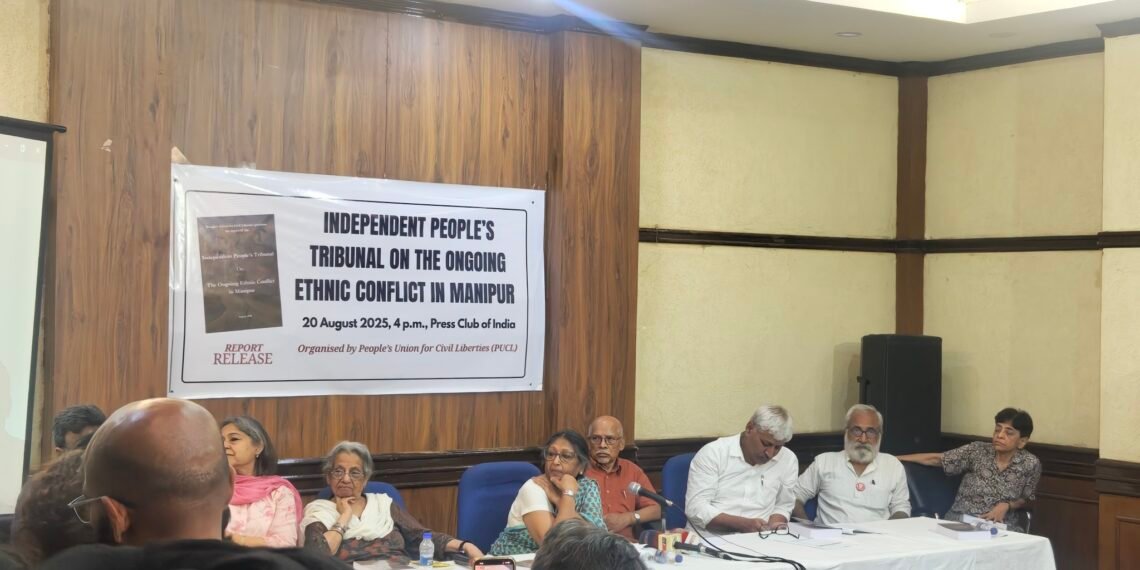The panel demanded reparations for victims, dismantling of armed groups, and reconciliation efforts. Survivors’ testimonies highlighted advance planning, institutional lapses, and targeted attacks.
By Navin Upadhyay
New Delhi, August 20, 2025 — The People’s Union for Civil Liberties (PUCL) has urged the Supreme Court to order and monitor an independent probe into the ethnic violence that tore through Manipur on May 3, 2023.
Unveiling the findings of its Independent People’s Tribunal on Manipur at a packed press conference in the Delhi Press Club, PUCL said its months-long inquiry—based on field visits and survivor testimonies—showed that the carnage was not a “spontaneous riot” but the outcome of systemic failures that exposed alarming fissures in India’s constitutional machinery.
PUCL President Kavita Srivastava and General Secretary V. Suresh, who led the press conference, said the report was a damning indictment of both state and central governments. The organisation demanded a Supreme Court–monitored judicial inquiry through a Special Investigation Team (SIT), along with immediate relief and reparations for survivors, dismantling of armed groups, and sustained reconciliation efforts.
“The Manipur crisis is not just a regional tragedy—it is a national constitutional failure that demands urgent political, legal, and moral redress,” the report said.
Background: A Tribunal Born of Crisis
The tribunal was set up by PUCL in response to prolonged ethnic violence between the Hindu-majority Meitei community in the Imphal Valley and the predominantly Christian Kuki-Zo in the surrounding hill districts. The conflict erupted on May 3, 2023, after a Manipur High Court order recommending Scheduled Tribe (ST) status for the Meitei community—opposed by tribal student unions and Kuki-Zo community, who feared displacement and loss of entitlements.
Long awaited @PUCLindia report on #Manipur Jury: Justice Kurian Joseph (former Supreme Court judge), Justice K. Kannan (former Punjab & Haryana High Court judge), Justice Anjana Prakash (former Patna High Court judge). A damning account of systemic governance failure, ethnic…
— Teesta Setalvad (@TeestaSetalvad) August 20, 2025
The violence has since claimed over 260 lives, displaced nearly 60,000 people, and destroyed thousands of homes and religious sites. By late 2024, Manipur had splintered into sharply divided enclaves, with no Meiteis left in the hills and no Kukis in the valley.
READ: Biren Singh Tape: CFSL Made Mockery of Forensic Protocols
Chaired by former Supreme Court Justice Kurian Joseph, the tribunal included Justices K. Kannan and Dr. Anjana Prakash, former IAS officer M.G. Devasahayam, retired IPS officer Dr. Swaraj Bir Singh, and historian Prof. Uma Chakravarti. The panel held hearings in Delhi in July 2024 and visited violence-hit districts in May–June 2024, collecting testimonies from survivors, displaced families, lawyers, journalists, doctors, and officials.
Key Findings
- Human Rights Violations on a Massive Scale
- Over 260 deaths, thousands injured, and nearly 60,000 displaced.
- 4,786 homes and 386 places of worship—both temples and churches—destroyed.
- Evidence of sexual violence against Kuki-Zo women, mob killings, beheadings, and public humiliation.
- Targeted ethnic cleansing: no Kukis remain in Imphal Valley, no Meiteis in the hill areas.
- Breakdown of Constitutional Governance
- The tribunal found “a total collapse of constitutional order” in Manipur.
- Former Chief Minister N. Biren Singh’s government was seen as partisan, deepening ethnic divides.
- Security forces—including Manipur police and commandos—were accused of acting selectively depending on the victim’s community.
- Looting of police armories armed vigilante groups like Arambai Tenggol and Meitei Leepun, which committed atrocities without fear of prosecution.
- Complicity and Failure of State & Central Governments
- Testimonies alleged that Meitei vigilante groups enjoyed political patronage and often operated alongside police.
- Evictions of Kuki villagers, accusations of drug trafficking, and rhetoric about “illegal immigrants” heightened tensions before May 3, 2023.
- Despite India’s long experience with insurgency in the Northeast, the violence was neither contained quickly nor impartially addressed.
- The Centre imposed President’s Rule only in February 2025 after Biren Singh resigned, but the tribunal said this came “far too late.”
- Impact on Communities
- Families in relief camps face hunger, disease, and trauma, with women and children particularly vulnerable.
- Education and healthcare remain severely disrupted.
- A “militarized buffer zone” now separates Meitei and Kuki territories, hardening ethnic division.
Press Conference Highlights
At today’s release, PUCL leaders stressed that the tribunal’s findings should be read as a “Report to the Nation.”
- Testimonies & Evidence: Firsthand accounts of killings, sexual violence, and displacement underline the report’s findings.
- Accountability: The tribunal called for prosecution of vigilante groups and investigations into state complicity.
- Recommendations:
- Disarmament and recovery of looted weapons.
- Non-discriminatory relief and rehabilitation for displaced families.
- Establishing a joint peace committee with equal representation of both communities, including women.
- Supreme Court–monitored investigations into sexual violence and mass killings.
- Mental health and trauma care, particularly for survivors of sexual assault.
The report situates the Manipur crisis within India’s constitutional framework, arguing that the state’s failure to uphold equality and protect minorities erodes the very foundations of democracy.
It also references explosive allegations against Biren Singh, including leaked audio clips purportedly showing his complicity in allowing vigilante groups to loot weapons—an issue still under Supreme Court scrutiny as of April 2025.
READ: Opinion: HC Rebuke Flags Tribal Rights vs Crony Capitalism in Assam
International human rights bodies, including the UN and Amnesty International, have already raised concerns over the violence. The PUCL report adds weight to calls for urgent accountability and systemic reform.
The PUCL Tribunal’s 2025 report offers one of the most detailed and damning accounts yet of the Manipur crisis. Far from being a spontaneous outburst, the tribunal concludes, the violence was nurtured by political patronage, security force bias, and governance collapse.
By framing the violence as a “national constitutional failure,” PUCL places the burden squarely on the Indian state to ensure justice, disarm vigilantes, and rebuild trust between communities. Without this, it warns, Kuki-zos’ wounds will remain open, and the very promise of constitutional democracy will stand diminished.














